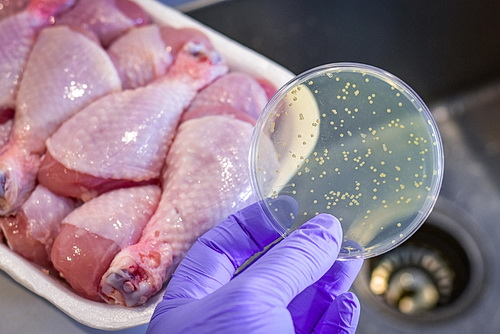
Listeria Introduction
Food poisoning can occur in many ways. Mainly, it comes from eating bad food, such as rotten cheese. Listeria is one of these food poisoning illnesses.
In this blog post, we will answer the questions you may have about this disease and provide information on how to protect yourself.
So What is Listeria?
It is a bacterial infection that can cause serious illness, especially in pregnant women, older adults, and people with weakened immune systems.
Where Does It Come From?
The bacteria can be found in soil, water, and certain animals, and can be present in food, especially if it is not handled or cooked properly. When a person ingests Listeria, it can cause a serious infection known as Listeriosis.
How Does Listeria Affect Your Health?
The symptoms can vary depending on the severity of the infection. Some people may not experience any symptoms, while others may develop severe health issues within a few days of ingesting the bacteria.
The symptoms can be flu-like, such as fever, muscle aches, and diarrhea. In severe cases, it can cause meningitis, sepsis, or even death.
Who is at Risk of Getting the Disease?

While anyone can become infected with the disease, certain groups of people are at higher risk. As mentioned, pregnant women, older adults and people with weakened immune systems are particularly vulnerable to the disease.
Specifically, pregnant women are ten times more likely to be infected with the illness than the general population. This is because the immune system is naturally weakened during pregnancy, making it harder to fight off infections and it can cause miscarriages, stillbirth or severe illness in newborns.
Older adults and people with weakened immune systems are also more susceptible to Listeriosis because their bodies may not be able to fight off the infection as effectively.
How Listeria is Diagnosed and Treated
If you suspect that you may have been infected with Listeria, it is important to seek medical attention right away. A doctor can perform a blood test or spinal fluid test to diagnose Listeriosis.
If you are diagnosed with the disease, your doctor may prescribe antibiotics to treat the infection. In severe cases, hospitalization may be necessary to provide supportive care and prevent complications.
Preventing Infections Through Proper Food Handling

One of the most effective ways to prevent this type of food poisoning is through proper handling. This means washing your hands and utensils regularly, cooking food to the appropriate temperature, and storing food properly.
It is also important to avoid certain high-risk foods, such as those mentioned below. These foods are more likely to be contaminated with bacteria, especially if not handled right, and should be avoided, especially by pregnant women and other high-risk individuals.
Foods That Are Commonly Associated with Listeria
The bacteria can be found in a variety of foods, but certain foods are more commonly associated with Listeria outbreaks. These include, but are not limited to:
-
-
- Deli meats and hot dogs.
- Smoked seafood.
- Unpasteurized dairy products.
- Soft cheeses, such as feta, brie, and camembert.
- Raw sprouts.
- Prepared salads, such as chicken or egg salad.
-
Outbreaks and Recalls
Listeria outbreaks can occur when contaminated food is distributed and consumed by large numbers of people. In recent years, there have been several high-profile outbreaks, including one in 2011 that was linked to cantaloupe and resulted in 33 deaths.
Last month, a 10-state outbreak of Listeria occurred. Although the number of people who contracted the disease is low, it is still a serious matter. The ages range from 47 to 88 years old and are in the states of Arkansas, California, Colorado, Missouri, New York, North Carolina, Pennsylvania, South Dakota and Washington.
And what appears to be a separate incident, but occurred in the same month was a recall of food products that may have been contaminated with Listeria resulting from a test by the Fresh Ideation Food Group LLC in Baltimore.
It is important to stay informed about these recalls and to avoid consuming any recalled products.
Importance of Food Safety Regulations
Food safety regulations are in place to protect consumers from harmful bacteria. These regulations set standards for food handling, processing and distribution to ensure that food is safe to eat.
Conclusion
Listeria is a harmful bacteria that can cause serious illness, especially in high-risk individuals such as pregnant women and older adults. Symptoms include fever, muscle aches, and diarrhea, and the infection can be diagnosed through blood or spinal fluid tests.
Preventing these infections is possible through proper food handling and avoiding high-risk foods. It is also important to stay informed about Listeria outbreaks and recalls to avoid consuming contaminated products.
We encourage everyone to be mindful of food safety and to take steps to protect themselves and their families from harmful bacteria such as Listeria.
